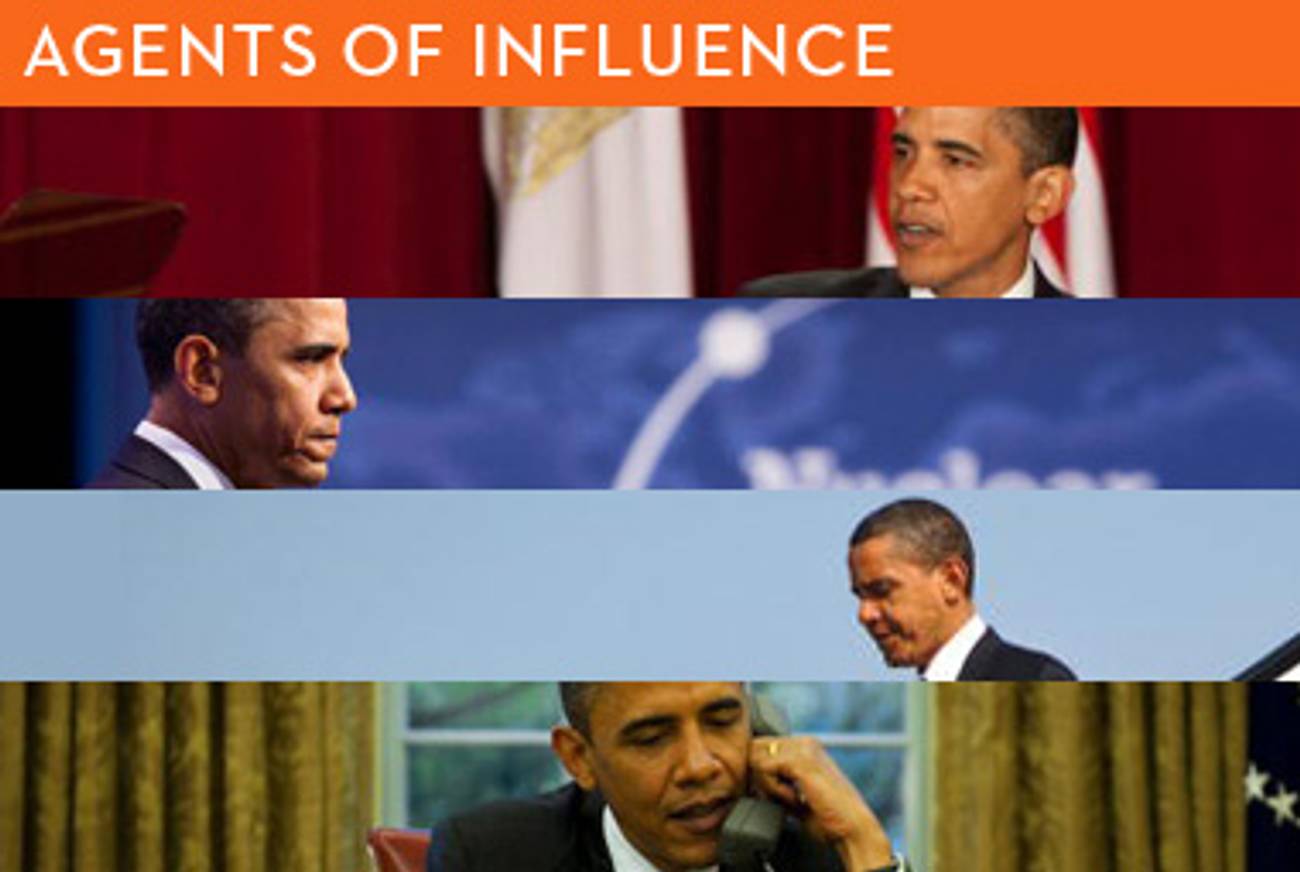Obama in the Mideast
Part 2 of 2: Ramin Ahmadi, Lokman Slim, Martin Kramer, and Jacob Weisberg consider the president’s policies in the region.




Tablet Magazine invited experts from the foreign policy community—policymakers, diplomats, activists, and analysts from both Washington and the Middle East—to offer their assessments of President Barack Obama’s Middle East policy. A year and a half into one of the most celebrated presidencies in recent memory—celebrated not just here but throughout much of the world—has Obama managed to hit the reset button in a part of the planet that the George W. Bush Administration had almost willfully alienated and enraged? Or has the new commander in chief misread notoriously tricky ground, empowering U.S. enemies and weakening Washington’s traditional allies?
We asked where the White House had succeeded or failed—on questions from the state of the Israeli-Palestinian conflict to the Iranian nuclear program, from U.S. wars in Afghanistan and Iraq to the region’s rising powers, like Turkey and Qatar.
Here’s the second batch. Read more—including Elliott Abrams and Robert Malley—in yesterday’s post.
‘Cairo: Part II’
Lokman Slim is a Lebanese publisher, filmmaker, and activist:
For those who benefited unequivocally from the previous administration’s Middle East policy, the ripples of uncertainty created by Obama’s pledges of a messianic “new start” were felt well before his inauguration, and even before his election to office. The dilemma President Obama would face was clear: how to prioritize salvaging the successes versus creating a changed image of America in the Muslim world. Although the Cairo speech of June 4 last year showed all the willingness to favor the second, it’s not clear that the speech’s recipients reacted to it as was expected. This lack of enthusiasm draws, partially, the limits of the all-out engagement policy.
Despite great sacrifices and numerous blunders made by the United States under his predecessor, Obama must face squarely the reality that from Lebanon to Iraq to Afghanistan a return to the status quo ante is neither possible nor desirable. Obama too eagerly lowered the flag of democracy in order to raise the flag of engagement. And while the former may have become viewed as a euphemism for military intervention, the latter has quickly become a euphemism for giving up. At the level of policy and diplomacy, this confusion must be erased—especially vis-à-vis those who continue to struggle for change.
We heard rumors in Beirut that a follow-up address focusing on political reform was in the pipeline—but this was never delivered. It’s high time for a Cairo: Part II.
‘A Zero-Sum Game’
Martin Kramer is the Wexler-Fromer fellow at the Washington Institute for Near East Policy and a senior fellow at the Shalem Center in Jerusalem:
“Power is no longer a zero-sum game. No one nation can or should try to dominate another nation. No world order that elevates one nation or group of people over another will succeed. No balance of power among nations will hold.” Thus spoke Barack Obama to the U.N. General Assembly last September. This must rank with George W. Bush’s “bring ’em on” as an invitation to America’s adversaries to defy it. Bush later expressed regret that he said his words, noting that “in certain parts of the world they were misinterpreted.” Obama likewise may rue having spoken his.
In the Middle East, power is a zero-sum game, domination by a benevolent hegemon creates order, and the regional balance of power is the foundation of peace. It’s the pax Americana, and while it may be stressful to uphold it, the alternative is more stressful still. And as the impression of American power wanes, we are getting a foretaste of “post-American” disorder. A struggle has begun among the middle powers—Iran, Turkey, and Israel—to fill the vacuum. Iran floods Lebanon with rockets, Turkey sends a flotilla to Gaza, Israel sends an assassination squad to Dubai—these are all the signs of an accelerating regional cold war. Each middle power seeks to demonstrate its reach, around, above, and behind the fading superpower.
The response in Washington is to huff and puff, imposing settlement “freezes” and “crippling” sanctions. This is the illusion of power, not its substance. The Obama Administration is bringing the United States out of the Middle East, to a position from which it believes it can “contain” threats with diplomacy, deterrence, and drones. As the United States decamps, its allies will feel insecure, its enemies emboldened. The Middle East’s stress test has begun.
‘Less Political Capital’
Jacob Weisberg is the chairman of the Slate Group and the author of The Bush Tragedy:
Obama made the classic mistake of being optimistic about the Arab-Israeli conflict. He assumed that his predecessors hadn’t tried hard enough, or had gotten it wrong, and that his personal intervention could make the difference. What Obama failed to appreciate is how much the odds are stacked against any U.S. president changing the fundamental realities of the Middle East. If the conflict can’t be resolved—and for the time being, I don’t think it can be—it’s wise to avoid investing political capital in the issue.
Presidents have a tendency to do the opposite of what their predecessors do. Because George W. Bush had stepped away from the peace process, Obama was inclined to step into it. American presidents do need to keep up a certain level of pressure on both sides, both as a show of good faith throughout the region and because someday there may be a deal to be had. But my sense is that Obama let his enthusiasm about reversing Bush’s broken policies delude him into thinking he could fix something he couldn’t.
Sadly, the Arab-Israeli conflict has seldom looked more intractable. I think Obama has been very frustrated with the Netanyahu government, as are most sensible people. He has not been able to get significant concessions from Netanyahu on the settlements, an issue where he is completely right and the right is completely wrong. On the Arab side, Obama has also been unable to get any meaningful concessions from Syria, Saudi Arabia, Hamas, or Hezbollah. He can’t even get the conversation started, let alone broker a deal.
Obama quickly developed a reputation for being unfriendly to Israel, which is wrong and unfair. Israelis make assumptions about Obama’s political views that aren’t correct—that because he has Muslim family connections he must be instinctively anti-Israel. Or they associated him with the views of other African-American politicians, like Jesse Jackson. That view gets transmitted to American Jews, some of whom share the same prejudices. The perception that he’s not an instinctive friend of Israel has hurt him politically, and it’s hard to undo. In fact, I think Obama holds mainstream Democratic Party views about Israel—he is a reflexive friend and ally who is hostile to Netanyahu because Netanhayu doesn’t truly accept the idea of a two-state solution.
While I don’t think Obama is likely to walk away from the peace process or give up, I wouldn’t be surprised to see him de-prioritize it. If he could point to a success and say, for instance, that he got a settlement freeze from Netanyahu, he might be more willing to take additional political risk. As it is, he got nothing and made himself look bad with a very important political constituency, American Jews. Rahm Emanuel and David Axelrod certainly appreciate this. If he learned anything from his initial experience with the issue, the president will invest less political capital in it going forward. (As told to Lee Smith.)
‘Grand Bargain’
Ramin Ahmadi is a founder of the Iran Human Rights Documentation Center and has trained young Iranians in nonviolence workshops for a decade:
The debate over Obama’s Iran policy is between those on one hand who insist that the president has not given enough support to the Green Revolution and, on the other hand, those, mostly affiliated with Washington’s Iran lobby, who have blamed the president for not moving fast enough to normalize relations and secure a Grand Bargain. This argument reflects the fact that the Obama Administration lacks a coherent Iran policy.
In its early days, the administration appeared convinced that the Iranian regime was stable and Mahmoud Ahmadinejad had the support of a majority of Iranians. Therefore, the only rational approach would be to pursue a Grand Bargain, involving a nuclear compromise in return for economic assistance and legitimacy for the thugs in Tehran. But if Washington’s Iran lobby had worked so hard on formulating this Grand Bargain, how was it then that Tehran seemed mostly uninterested?
Then came the thunder. The White House never saw Iran as a country on the verge of a great democratic upsurge, and Iran’s nonviolent Green Revolution shook the administration in Washington even more than the regime in Tehran. The Obama team had to reassess its understanding of the country. The administration had looked at Iran’s democratic revolution as an inconvenience, and yet it didn’t seem wise to make concessions to an appalling regime that was falling apart. The Green Revolution is a powerful display of “people’s power,” and yet it has not toppled the regime after a full year, effectively putting all the possible rapprochement initiatives on hold. It exposed the brutality and corruption of the regime in Tehran and the lack of a cohesive Iran policy here in Washington. It took Obama some time to voice any support for the Green Revolution and when he finally did, it was too little too late.
This is the second in a two-part series. Read part one.
Lee Smith is the author of The Consequences of Syria.
Lee Smith is the author of The Permanent Coup: How Enemies Foreign and Domestic Targeted the American President (2020).